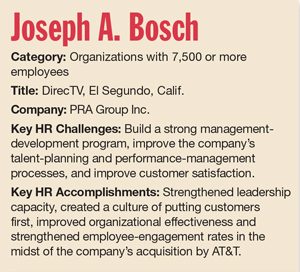This article accompanies The Re-inventor.
Thanks to AT&T’s recently completed acquisition of DirecTV, Joseph A. Bosch is now out of a job. But he’s OK with that.
“I’m excited that one of my people will be taking on my role,” says the 32,000-employee company’s executive vice president and CHRO (his boss, CEO Mike White, will also be leaving once the merger is complete).
Since joining DirecTV five years ago, Bosch has built an enviable record of accomplishment at the El Segundo, Calif.-based company, which provides digital television services to millions of satellite TV subscribers in the United States and abroad. It includes a significant upgrade of the company’s manager-development program, burnishing DirecTV’s employer brand to lure more millennials while retaining talented Gen Xers and baby boomers, and helping to improve customer satisfaction while also boosting employee-engagement rates.
Bosch – who spent three years in the U.S. Army as a military policeman before graduating from Cornell University with a degree from its acclaimed Industrial and Labor Relations program – began his career at PepsiCo.
“I was very fortunate to get hired by PepsiCo,” he says. “I learned a lot in my first nine years there.”
Indeed, his experience at the beverage conglomerate (Bosch has also worked at Tenet Healthcare and Centex Homes) drew the attention of White, who’d stated that he wanted someone from either General Electric or PepsiCo (both of which have highly respected HR functions) as CHRO, he says.
Bosch says he’s most proud of his part in helping to redefine the role of manager at DirecTV.
“We’ve put a premium on that role and reorganized the expectations, responsibilities and standards of leadership – and that’s what’s led to a lot of our success around employee engagement and overall performance,” he says.
Today, managers at DirecTV are expected not only to be competent and know their stuff, but to have very good interpersonal skills, be able to work across multiple functions and be trusted by their employees. Above all, says Bosch, they’re expected to truly care about their people and have a clear understanding that their role is to lead and manage.
“We also want managers who are curious – who want to understand how other things work, [and who] have a broad perspective on both the world and the company,” he says. “What separates the great from the average is that they really do care about people.”
Bosch and White together helped teach a week-long leadership-development course for the company’s senior managers that focused on these new expectations.
What they wanted from senior managers was also reinforced through the company’s reward structure and talent-planning process, which now includes 360 reviews, annual top-leadership meetings, new courses on coaching and leadership, and annual talent reviews that probe deep within the organization. Bosch also helped overhaul DirecTV’s performance-management program, doing away with formal ratings – which research had shown to be demotivating – and replacing them with “ongoing dialogue” between supervisors and employees.
Since these initiatives began, there has been a 29-percent increase in the number of DirecTV’s “ready now” successors.
Bosch also led DirecTV’s efforts to create a more customer-focused culture within the organization.
“We basically did Change Management 101,” says Bosch.
With White’s sponsorship behind him, Bosch helped lead a turnaround initiative that included tapping one of DirecTV’s best high-potential employees to oversee the effort. It included having leaders spend time on the customer front lines with technicians and customer-care representatives and making some changes to previous policies that “had really irritated our customers.”
Since the initiative began, “net promoter scores” (which measure the loyalty between a company and its clients) are up by 12 points among customer-care staff and 18 points among technicians.
One of the most important outcomes was that all employees there now believe “that the customer experience is part of their job, regardless of what function they’re in,” says Bosch.
DirecTV’s internal numbers also rose during Bosch’s tenure – specifically, its employee-engagement numbers, which went from 77 percent favorable in 2010 to 88 percent favorable this year. These high scores are especially remarkable in the midst of an acquisition, typically a stressful time for most employees. Bosch cites a partnership with McKinsey & Co. to identify the strengths of DirecTV’s current culture and the desired cultural attributes of the present and the future.
 McKinsey helped determine that DirecTV has “exceptionally strong organizational health,” placing it in the top 1 percent of all companies it has surveyed. As a result, the combined organization’s culture has been identified as an important success factor for the merger, while 72 percent of employees say they are excited about working for the combined company and 96 percent say they are willing to put in “a great deal of effort beyond what is normally expected” to help the company.
McKinsey helped determine that DirecTV has “exceptionally strong organizational health,” placing it in the top 1 percent of all companies it has surveyed. As a result, the combined organization’s culture has been identified as an important success factor for the merger, while 72 percent of employees say they are excited about working for the combined company and 96 percent say they are willing to put in “a great deal of effort beyond what is normally expected” to help the company.
Bosch – who, in his spare time, enjoys golfing and paddle-boarding in the ocean not far from his southern California home – says he doesn’t yet have plans for what he’ll be doing now that he’s left DirecTV, but is looking forward to whatever the future may bring.
“I’m actually fine with leaving – it’s a good time for change,” he says.

